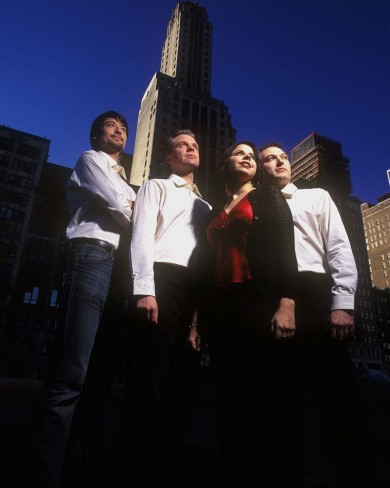Pacifica Quartet opens new year with first-rate Haydn at the Kravis Center

The Pacifica Quartet performed Friday afternoon at the Kravis Center in West Palm Beach. Photo: Laurence Baker
The Pacifica Quartet returned to South Florida for the first concert of the new year in Kravis Center’s Regional Arts Series Friday afternoon in West Palm Beach.
Currently quartet in residence at Indiana University’s Jacobs School of Music, the Pacifica is a first-rate group, its members playing with tightly calibrated ensemble and abundant musicianship. They successfully navigated the acoustical difficulties of performing in the Dreyfoos Concert Hall, a venue definitely not designed for chamber music. The group’s sonority was rich and clear and they managed to infuse their playing with a varied range of dynamics while remaining audible in the hall’s vast space.
Perhaps because the concert was being played one day after the New Year’s holiday, there were many empty seats and the audience’s response was strangely muted and unenthusiastic. This was unfortunate because the Pacifica offered some fine music making, particularly in the concert’s first half.
Haydn’s Quartet in B-flat Major, Op. 76, No. 4 derives its title “Sunrise” from the ascending line of the opening theme in the first violin, played over one sustained chord. Simin Ganatra’s lean, compact tone and musical exactitude melded organically into the ensuing Allegro, the repeated sixteenth notes strongly accentuated. Cellist Brandon Vamos gracefully shaped the more stately secondary melody.
The players gave due weight to the Adagio’s solemn cast without losing forward momentum. Playing with spare vibrato, the timbral blend and ensemble cohesion were smooth and polished. When the two violins played in unison, Sibbi Bernhardsson and Ganatra sounded as one.
The Menuetto mixed classical finesse with Haydn’s witty twists of phrase, the viola and cello’s brisk drone sounds a delight. The quartet took Haydn’s marking ma non troppo (not overly fast) for the final Allegro seriously, assaying the quirky themes and sudden dissonances with charm while saving their full-throttle power for the mock sturm und drang of the central episode.
The first movement of Ravel’s Quartet in F Major was played much faster than usual, the players emphasizing the hazy harmonics. Masumi Per Rostad’s viola solo was clean and flowing without the overly perfumed sensibility of many performances. The violins brought a wiry edge to the melodic contours of the second movement, the plucked figures brisk and pungent. There was a pensive, eerie aura in the Très lent (third movement), the tension beneath the music’s quiet surface never flagging.
The rhythmic shifts of the finale were seamlessly achieved, the tone aggressive and hard driving. Despite the headlong tempos, the players’ intonation remained precise and the quartet’s fresh, modern approach to Ravel’s masterpiece proved stimulating.
Brahms’ Quintet in F minor for piano and strings, comprising the concert’s second half, was the afternoon’s nadir. The performance was originally planned to herald the return of Canadian pianist Anton Kuerti who was stricken during a concert for Miami’s Friends of Chamber Music in October, 2013. Apparently Kuerti has not recovered sufficiently to perform and Christopher O’Riley was his replacement for the Brahms quintet.
Best known as the host of the classical teen talent search radio program From the Top and for his piano transcriptions of songs by the rock bands Radiohead and Nirvana, O’Riley has more recently formed a duo with cellist Matt Haimovitz.
O”Riley’s playing was efficient and accurate but his tone was often hard and monochromatic. In the opening movement, he was not always in synch with the Pacifica and there were moments of rough ensemble playing. The Adagio rarely probed below the surface gleam of Brahms’ melodic writing, O’Riley at times fading into inaudibility. He resorted to harsh pounding in the Scherzo but the music’s rhythmic propulsion was on a low boil.
Only in the final movement did the performance come together. O’Riley was at his most intense and idiomatic, exuding the mystery of the slow introduction and bringing strong voltage to the coda. Still, for most of the performance, Brahms’ fire and dark lyricism were in short supply.
The Regional Arts Concert Series continues with Vladimir Lande conducting the St. Petersburg State Symphony Orchestra in works by Bernstein, Schumann and Shostakovich with cello soloist Dmitry Kouzov 8 p.m. Wednesday at the Kravis Center in West Palm Beach. kravis.org 561-832-7469
Posted in Uncategorized
Leave a Comment
Sat Jan 3, 2015
at 1:19 pm
No Comments






